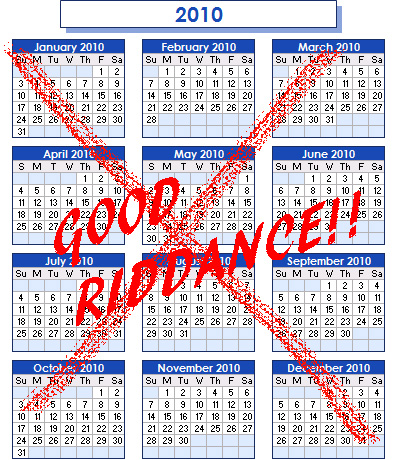2010: Annus Horribilis for GlaxoSmithKline?
December 20th, 2010. By Kristine B
 Let’s face it, lots of drug companies face a variety of lawsuits and fines from the government. But 2010 might be a year that GlaxoSmithKline would wipe from its memory if it could—a sort of annus horribilis, if you will. Between the reported Paxil settlements, massive fines for illegal activity at its Puerto Rico plant and huge restrictions on its diabetes drug, Avandia, GSK appeared to be facing a TKO as we moved into 4Q’2010. So officials at GlaxoSmithKline could be forgiven if they toast the New Year and hope it’s better than the last 12 months…
Let’s face it, lots of drug companies face a variety of lawsuits and fines from the government. But 2010 might be a year that GlaxoSmithKline would wipe from its memory if it could—a sort of annus horribilis, if you will. Between the reported Paxil settlements, massive fines for illegal activity at its Puerto Rico plant and huge restrictions on its diabetes drug, Avandia, GSK appeared to be facing a TKO as we moved into 4Q’2010. So officials at GlaxoSmithKline could be forgiven if they toast the New Year and hope it’s better than the last 12 months…
Paxil Settlements
Earlier this year, various media outlets reported that GlaxoSmithKline agreed to settle certain lawsuits alleging Paxil caused birth defects. According to Bloomberg, the drug maker agreed to pay more than $1 billion to settle approximately 800 lawsuits.
Meanwhile, a separate lawsuit also alleging Paxil birth defects, saw the family of an infant who died less than two months after birth, settle with GlaxoSmithKline for an undisclosed amount. In yet a different lawsuit, the family of a boy born with heart defects was awarded $2.5 million by a jury, which found that GlaxoSmithKline officials “negligently failed to inform” the mother’s physician about the risk of birth defects.
Fines for the Glaxo Puerto Rico Plant
In October of this year, GlaxoSmithKline agreed to pay $750 million to settle allegations of wrongdoing at the company’s Puerto Rico plant, which is now closed. An investigation into the plant found that improper manufacturing procedures resulted in medications that could split apart or had improper amounts of the active ingredient. Officials alleged that GlaxoSmithKline knowingly manufactured, distributed and sold medications that did not meet FDA standards.
As part of the settlement, a whistleblower in the case received a whopping $96 million. So for her, 2010 might just have been a fantastic year.
Avandia
Also this year, GlaxoSmithKline learned that its diabetes drug, Avandia, would carry severe restrictions on who can take the medication. The decision came after an FDA advisory panel recommended that use of Avandia be restricted in light of serious side effects. Patients who are not currently on Avandia will have to try other diabetes medications before using Avandia and will have to show they have been made aware of Avandia side effects. Although some people consider it a victory that Avandia was not pulled entirely from the market, these restrictions will likely have an impact on Avandia profits.
Based on those three issues alone, 2010 might be a year that GlaxoSmithKline tries—ever so hard—to forget.
-
Leave a Reply
Archive by Category
- Accidents (24)
- Airlines (9)
- Asbestos Mesothelioma (262)
- Automotive (25)
- Celebrity (14)
- Class Action (84)
- Complaints/Comments (15)
- Consumer Fraud (84)
- Contest (2)
- Court of Public Opinion (5)
- Crazy Sh*t Lawyers See (61)
- Criminal Law (4)
- Defective Products (111)
- DePuy ASR Hip Recall (2)
- Discrimination (22)
- Drugs/Medical (248)
- Elder Care Abuse (4)
- Emerging Issues (462)
- Employment (54)
- Environment (52)
- Financial (28)
- Food Illness (15)
- Human/Civil Rights (4)
- Insecurities (5)
- Insurance (16)
- Intellectual Property (16)
- Internet/E-commerce (19)
- lawsuits (161)
- Lawyers (20)
- Lawyers Giving Back (43)
- Lex Levity (10)
- Personal Injury (106)
- Pleading Ignorance (53)
- Real Estate (2)
- Recall (6)
- Scam (3)
- Securities (13)
- Settlement (81)
- Tort Reform (2)
- Totally Tortelicious (81)
- Veterans (11)
- Whistleblower (9)